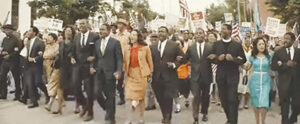By Hazel Trice Edney
(TriceEdneyWire.com) – Anyone conscious of Black progress during the 1960s, ‘70s and ‘80s clearly remembers songs like James Brown’s “I’m Black and I’m Proud,” Marvin Gay’s “What’s Going On?” and Stevie Wonder’s popular “Happy Birthday” song to the assassinated Dr. Martin Luther King Jr. in pursuit of a national holiday in his honor.

And then, there was that unforgettable 1963 song composed and sang by singer-song writer and pianist Nina Simone that the Library of Congress has described as a “biting song about racial injustice” that was “more commentary than anthem”. The song, “Mississippi Goddam” was written in response to the June 12, 1963 assassination of civil rights activist Medgar Evers in Jackson, Mississippi and the killing of the four little girls in the Ku Klux Klan bombing of the 16th Street Baptist Church in Birmingham, Alabama on September 15 that year.
It was songs like these – among many others – that pushed for justice and social change by putting the words in the mouths of people, words that were already in their hearts, the words that oppressors needed to hear. The history and tradition of Rhythm and Blues, Soul music and, yes, even some Rap music – minus the misogyny and flagrant use of the N-word – have continued as a 21st Century weapon against racial inequality, White supremacy and a tool for the dismantling of structural racism, economic oppression, and the end to police brutality.
In 2024, key artists, such as Academy Award winning John Legend, are clearly following the lead of these predecessors, who not only advocated for justice in their words, but used their money philanthropically toward advancement in the Black community.

“I’ve always been inspired by the tradition of particularly Black artists over the years, realizing that when we have this opportunity, when we have this platform, we want to use it to stand up for what’s right, fight for justice, support activists and organizers who are out there doing really important work to secure freedom for all citizens,” Legend said in a televised interview with CNN’s Victor Blackwell during the network’s Juneteenth celebration. “I come from a tradition of that, I believe. When I think about my mentors and my heroes like Harry Belafonte and others, they invested in the civil rights movement. They spent their money. They spent their social capital, and they used their platforms to try to make the world better. And I always thought that’s what an artist was supposed to do. So, I feel like this is part of my calling as an artist.”
Perhaps the best-known music in Legend’s activism is the song, “Glory”, for which he received an Academy Award for best original song in 2015. Legend wrote and sang the song with Grammy-Awarding winning actor and rapper Lonnie Rashid Lynn, better known by his professional name, Common. Together they produced “Glory”, for the movie, Selma, the story of Bloody Sunday, directed by Ava DuVernay.
There’s also Beyoncé’s “Freedom” song, a dedication to Black women: “I break chains all by myself. Won’t let my freedom rot in hell. Hey! I’ma keep running ‘cause a winner don’t quit on themselves.” The video features the mothers of Trayvon Martin, Michael Brown, and Eric Garner, all killed by police or symbols of authority.

The month of June, Black Music Appreciation Month, is an opportune time to recognize singers, songwriters and musicians who use their resources to advance causes of justice. First recognized by President Jimmy Carter in 1979, Black Music Appreciation Month, has come a long way, concludes President Joseph Biden in his proclamation celebrating the month in 2024.
Biden sums it up, “Black music began when enslaved people, who were cruelly prohibited from communicating in their native languages, found ways to express themselves through music. Set to the sound of African rhythms, they captured the inhumanity, tragedy, and toll that America’s original sin took on their lives while also telling the stories of their hopes and dreams, faith and spirituality, and love and purpose. Ever since, Black performers have carried on that tradition of using art to break down barriers, create sacred spaces for expression, and give voice to the promise of America for all Americans. They have created and shaped some of our most beloved genres of music — like folk, blues, jazz, hip-hop, country, rock and roll, gospel, spirituals, and R&B. Black music has set the beat of the Civil Rights Movement; expressed the inherent dignity and captured the pride and power of Black communities; and held a mirror to the good, the bad, and the truth of our Nation.”

